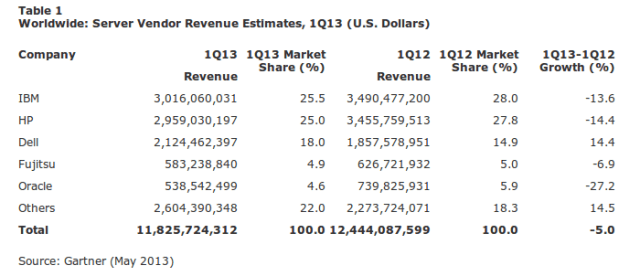Gartner Research reports worldwide server sales are down 5 percent for the first quarter of the year, with IBM, HP and other members of the top five taking the biggest hit. Server shipments declined 0.7 percent.
But the drop in server sales is not at all surprising. Cloud apps are popping up by the thousands across the market, as the developer movement speeds up. But these apps are not surfacing from that souped-up x86 server made for big workloads. Developers instead are turning to the cloud. Enterprise companies are buying fewer of those high-priced machines that customers once bought when IT budgets were plentiful.
According to Gartner, x86 server shipments were flat during the quarter, with revenues up 1.8 percent. Server revenues reflect the problems that the vendors face. All of the top five vendors suffered revenue declines in the first quarter of 2013 except for Dell which grew 14.4 percent.
RISC/Itanium Unix servers had a 38.8 percent drop in shipments and were down 35.8 percent in vendor revenue compared to the same quarter last year. Mainframes showed a 3.6 percent increase in worldwide revenue. They will never die.
These numbers don’t mention Google, Facebook or Amazon but they might as well, because they are buying up servers. But not the Rolls Royce versions; they’re buying the budget-variety, cheap machines as stripped-down as they can get them and are having servers made for them by the gross from companies like Quanta, which is killing it in the server business. Quanta is selling one out of every seven servers sold.
It gets even more disruptive when considering theOpen Compute Project. The open hardware organization, spearheaded by Facebook, is making a notable impact through its efforts to open-source servers and network switches. Quanta is planning to roll out more products based on OpenCompute specifications.
The server business foreshadows what’s to come. Enterprise companies will have to adapt to a new rock-bottom-priced server market and an open-source movement quickly gaining steam.

